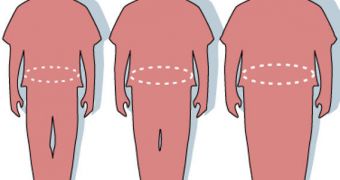Genetics experts announce the discovery of a regulatory master gene, that is involved in underlying the development of type II diabetes, and also in controlling and supervising the behavior of numerous other genes, that act within fat cells in the human body.
This finding indicates a possible new target of treatment in addressing obesity, and the diseases that come with it. Previous studies have demonstrated that the disorder increases risks for the development of other afflictions.
These include diabetes, cardiovascular problems, heart diseases and so on. This is why obesity is considered to be such a massive public health problem, especially in the United States. Only 33 percent of the population here is of normal weight.
Another third is classified as overweight, and the last 33 percent are obese. Under these circumstances, the costs associated with treating possible complications and associated disorders exceed several tens of billions of dollars annually.
The gene the new research focused on controls type 2 diabetes and cholesterol levels, explain researchers from the University of Oxford and the King's College London, in the United Kingdom.
“This is the first major study that shows how small changes in one master regulator gene can cause a cascade of other metabolic effects in other genes,” explains Tim Spector, a professor in the KCL Department of Twin Research. He is also the leader of the MuTHER project.
“This has great therapeutic potential particularly as by studying large detailed populations such as the twins we hope to find more of these regulators,” the investigator goes on to say.
The newly-found gene, dubbed KLF14, “seems to act as a master switch controlling processes that connect changes in the behavior of subcutaneous fat to disturbances in muscle and liver that contribute to diabetes and other conditions,” says Mark McCarthy.
“We are working hard right now to understand these processes and how we can use this information to improve treatment of these conditions,” adds McCarthy, a co-leader of the new study, and a professor a the University of Oxford.
Details of the new investigation appear in the May 15 online issue of the esteemed scientific publication Nature Genetics, Science Blog reports.

 14 DAY TRIAL //
14 DAY TRIAL //